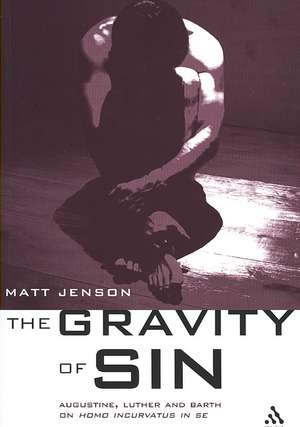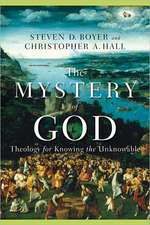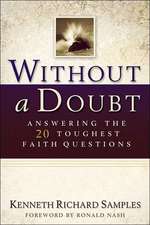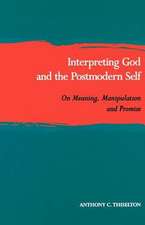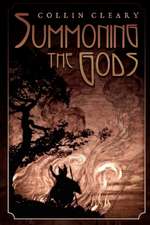The Gravity of Sin: Augustine, Luther and Barth on 'homo incurvatus in se'
Autor PhD Matt Jensonen Limba Engleză Paperback – 7 feb 2007
Matt Jenson argues that the image of being 'curved in on oneself' is the best paradigm for understanding sin relationally, that it has sufficient explanatory breadth and depth to be of service to contemporary Christian theology. He looks to Augustine as the Christian source for this image in his various references to humanity's turn to itself, though the threads of a relational account of sin are not drawn together with any systematic consequence until Martin Luther's description of 'homo incurvatus in se' in his commentary on Romans. Luther radicalizes Augustine's conception by applying this relational view of sin to the totus homo and by emphasizing its appearance, above all, in homo religiosus. The Western tradition of sin understood paradigmatically as pride has been recently called into question by feminist theologians. Daphne Hampson's critique of Luther on this front is considered and critiqued. Though she is right to call attention to the insufficiency of his and Augustine's myopic focus on pride, the question remains whether 'incurvatus in se' can operate paradigmatically as an umbrella concept covering a far wider range of sins. Karl Barth's extension of 'incurvatus in se' to apply more broadly to pride, sloth and falsehood suggests that incurvature can do just that.
Preț: 374.41 lei
Preț vechi: 517.74 lei
-28% Nou
Puncte Express: 562
Preț estimativ în valută:
71.64€ • 74.81$ • 59.16£
71.64€ • 74.81$ • 59.16£
Carte tipărită la comandă
Livrare economică 15-29 aprilie
Preluare comenzi: 021 569.72.76
Specificații
ISBN-13: 9780567031389
ISBN-10: 0567031381
Pagini: 224
Dimensiuni: 156 x 234 x 17 mm
Greutate: 0.37 kg
Editura: Bloomsbury Publishing
Colecția T&T Clark
Locul publicării:London, United Kingdom
ISBN-10: 0567031381
Pagini: 224
Dimensiuni: 156 x 234 x 17 mm
Greutate: 0.37 kg
Editura: Bloomsbury Publishing
Colecția T&T Clark
Locul publicării:London, United Kingdom
Caracteristici
Deals with key figures of historical theology (Augustine, Luther, Barth)
Cuprins
Introduction
1. Augustine's inward turn: An ambiguous beginning
Love makes the city
The goodness of the garden
Participation and relationality
Civic foundations
What happened? The beginning of sin
Falsehood
Pride
Isolation
Falling into slavery
The call to humility
Augustine's ambiguous inwardness in The Trinity
A conclusion
2. Luther's radical and religious invurvature
Setting the task
Simus iustus et peccator
Fuel to the fire: The persistence of the fomes
Copernicux Redux
The logic of person and works
Totus homo? The postures of death and spirit
Incurvatus in se as ignorance: The critique of natural understanding
Using, enjoying: Incurvatus in se as egoism
Homo religiosus as Homo incurvatus in se
The violation of vocation: Transgressing the limits of calling
Conclusion: Augustine versus Luther?
3. (How) Do women sin? Daphne Hampson and the Feminist critique of Luther
Introduction
Hampson's critique of Luther on sin, incurvatus in se and the self
Hampson's alternative
Transition: Key questions
Problems with a gendered approach to sin
Hampson's account of sin per se and the controlling factor of continuity
On the explanatory sufficiency of incurvatus in se
4. Broadening the range of the metaphor: Barth's threefold description of sin
Introduction
A brief apology for paradigms
Sin Christologically defined
Humanity through a Christological lens: A closer look
Sin as pride
Sin as falsehood
Sin as sloth
Hampson and Barth: A tale of two sloths
Conclusion
Coda
Select Bibliography
Recenzii
'Jenson offers a lively and learned analysis of the theme of sin as introversion and loss of relation; he has a good eye for the place of Christian teaching about sin in the corpus of Christian doctrine, a wide knowledge of modern theology, and a sure touch in exposition and critique. This is an intelligent piece of constructive theology, and it deserves many readers.' John Webster, Professor of Systematic Theology, King's College, University of Aberdeen
'A quite exceptional book, beautifully written, with lucidity and considerable eloquence. I can imagine it being read by professors as well as bright undergraduates, and to the considerable benefit of both. Jenson is advancing an impressive and compelling line on the doctrine of sin that made me re-think many of the classic debates.' Professor Jeremy Begbie, Ridley Hall, Cambridge and University of St Andrews
"A very rare combination of academic rigour with real clarity and absence of obfuscation by insight. It is likely to be the first of many publications by a scholar with a very bright future."
'Here is a superb study of one of the most crucial yet contested concepts in Christian anthropology--'homo incurvatus in se.' Jenson traces the development of this idea through Augustine, Luther, and Barth and also brings it into fruitful dialogue with recent feminist concerns. A great example of dogmatic retrieval in the service of theological renewal.' Timothy George, Dean of Beeson Divinity School of Samford University, and an executive editor of Christianity Today
"The Gravity of Sin is a stimulating and lucid account of Christian talk about sin, and it's a welcome contribution to the contemporary retrieval of this doctrinal theme."
"This is a fascinating and instructive study. The book is straightforward and clear in structure and prose...and Jenson wields a respectable command of the texts in question. Yet even if one were to differ regarding some aspect of his interpretations of Augustine, Luther, or Barth, the book's overall argument - regarding the merit of incurvature as an image of sin - is highly compelling." Brian Gregor, Heythrop Journal
"This is an extremely well-written books that covers some important ground. a good work of theology with a solid historical underpinning, clear analysis and contemporary relevance. It deserves to be read" Theolgical Book Review Vol.19 No.2 2007
"This is an original and important book, which ought to be read by all theologians interested in theological anthropology in general, and the doctrine of sin in particular. Jenson writes clearly, carefully and with an eye to the detail of the positions he expounds and seeks to engage." Journal of Reformed Theology 3, 2009
"Jenson's book assists us in having a broader understanding of sin, capable of guiding us to a fuller understanding of freedom from the bondage of sin in the person and work of Jesus Christ." -Adam J. Johnson, Themelios
'A quite exceptional book, beautifully written, with lucidity and considerable eloquence. I can imagine it being read by professors as well as bright undergraduates, and to the considerable benefit of both. Jenson is advancing an impressive and compelling line on the doctrine of sin that made me re-think many of the classic debates.' Professor Jeremy Begbie, Ridley Hall, Cambridge and University of St Andrews
"A very rare combination of academic rigour with real clarity and absence of obfuscation by insight. It is likely to be the first of many publications by a scholar with a very bright future."
'Here is a superb study of one of the most crucial yet contested concepts in Christian anthropology--'homo incurvatus in se.' Jenson traces the development of this idea through Augustine, Luther, and Barth and also brings it into fruitful dialogue with recent feminist concerns. A great example of dogmatic retrieval in the service of theological renewal.' Timothy George, Dean of Beeson Divinity School of Samford University, and an executive editor of Christianity Today
"The Gravity of Sin is a stimulating and lucid account of Christian talk about sin, and it's a welcome contribution to the contemporary retrieval of this doctrinal theme."
"This is a fascinating and instructive study. The book is straightforward and clear in structure and prose...and Jenson wields a respectable command of the texts in question. Yet even if one were to differ regarding some aspect of his interpretations of Augustine, Luther, or Barth, the book's overall argument - regarding the merit of incurvature as an image of sin - is highly compelling." Brian Gregor, Heythrop Journal
"This is an extremely well-written books that covers some important ground. a good work of theology with a solid historical underpinning, clear analysis and contemporary relevance. It deserves to be read" Theolgical Book Review Vol.19 No.2 2007
"This is an original and important book, which ought to be read by all theologians interested in theological anthropology in general, and the doctrine of sin in particular. Jenson writes clearly, carefully and with an eye to the detail of the positions he expounds and seeks to engage." Journal of Reformed Theology 3, 2009
"Jenson's book assists us in having a broader understanding of sin, capable of guiding us to a fuller understanding of freedom from the bondage of sin in the person and work of Jesus Christ." -Adam J. Johnson, Themelios
